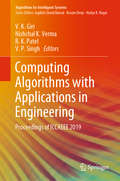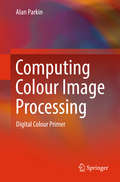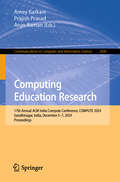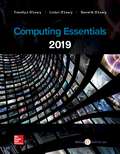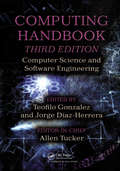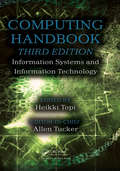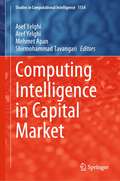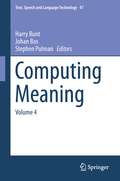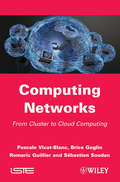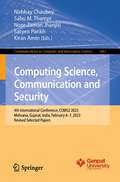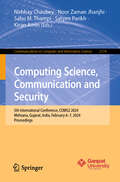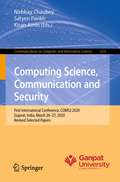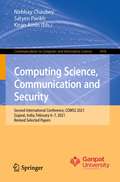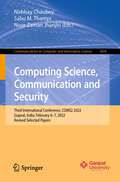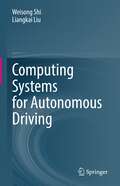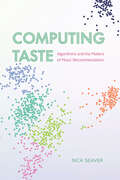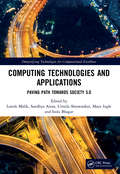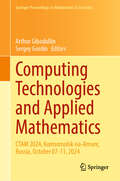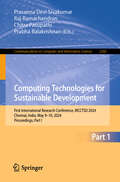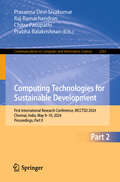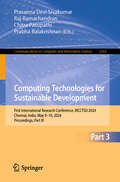- Table View
- List View
Computing Algorithms with Applications in Engineering: Proceedings of ICCAEEE 2019 (Algorithms for Intelligent Systems)
by Nishchal K. Verma V. P. Singh V. K. Giri R. K. PatelThis book collects high-quality research papers presented at the International Conference on Computing Applications in Electrical & Electronics Engineering, held at Rajkiya Engineering College, Sonbhadra, India, on August 30–31, 2019. It provides novel contributions in computational intelligence, together with valuable reference material for future research. The topics covered include: big data analytics, IoT and smart infrastructures, machine learning, artificial intelligence and deep learning, crowd sourcing and social intelligence, natural language processing, business intelligence, high-performance computing, wireless, mobile and green communications, ad-hoc, sensor and mesh networks, SDN and network virtualization, cognitive systems, swarm intelligence, human–computer interaction, network and information security, intelligent control, soft computing, networked control systems, renewable energy sources and technologies, biomedical signal processing, pattern recognition and object tracking, and sensor devices and applications.
Computing Colour Image Processing: Digital Colour Primer (SpringerBriefs in Applied Sciences and Technology)
by Alan ParkinThis book proposes a new approach to colour in digital images, based on the standard sRGB colour space and Python scripting. It covers creating, storing, processing, displaying, printing, and viewing colour images. The fundamental ideas presented include systematic reduction of colour resolution to manageable sRGB sub-spaces, analysis of any image as a tabular colour scheme, general transformation and specific substitution of colours, and revival of the traditional notion of a neutral balance by adjusting all colours or by adjoining a colour frame. The text includes Python scripts for the processes discussed, downloadable in the e-book. It is of interest to artists, designers, and anyone who works with sRGB colour images.
Computing Education Research: 17th Annual ACM India Compute Conference, COMPUTE 2024, Gandhinagar, India, December 5–7, 2024, Proceedings (Communications in Computer and Information Science #2400)
by Amey Karkare Prajish Prasad Arun RamanThis book constitutes the refereed proceedings of the 17th Annual ACM India Compute Conference on COMPUTE 2024, held in Gandhinagar, India, during December 5–7, 2024. The 12 full papers and 3 short papers included in this book were carefully reviewed and selected from 35 submissions. They were organized in topical sections as follows: India-specific Computing Education Research Issues; Assessment and Evaluation; Interactive Tools, Visualizations and Learning Analytics; and Beyond CS1: Computing Education Research in Upper Level Courses.
Computing Essentials 2013 Introductory Edition: Make IT Work for You
by Timothy J. O'Leary Linda I. O'LearyComputing Essentials 2013 allows you to Make IT Work for You through relevant Explorations, Ethics and Environment themes throughout each chapter.
Computing Essentials 2019
by Daniel O'Leary Timothy O'Leary Linda O'LearyThe rate of change in the digital information age is clearly increasing, and computer literacy is becoming a prerequisite. The goal of the 27th edition of Computing Essentials is to provide students with an introductory understanding of the concepts necessary for success and to instill an appreciation for the effect of information technology on people, privacy, ethics, and our environment. Today's students put much effort toward the things that are relevant to them, yet it is sometimes difficult to engage them in other equally important topics like personal privacy and technological advances. <p><p> Each chapter highlights a most promising career in IT—including webmaster, software engineer, and database administrator—by presenting job titles, responsibilities, educational requirements, and salary ranges. Students see the material relate directly to potential career paths. <p> Each chapter describes how its content is relevant to students' lives today and critical to their future. Each chapter presents practical tips related to key concepts through the demonstration of interesting and relevant applications. Topics presented focus first on outputs rather than processes and then dive into the concepts and processes.
Computing Essentials for an IT Age with Applications
by David FilerComputing Essentials for an IT Age introduces students to the plethora of computer systems and networks - along with the constantly evolving benefits they offer. Created for both online and in-person introduction to computers courses, this turn-key course package includes a beautiful color lecture manual (eBook), lab content, tests, and quizzes all in a digital package.
Computing Handbook: Computer Science and Software Engineering
by Teofilo Gonzalez Jorge Diaz-HerreraThe first volume of this popular handbook mirrors the modern taxonomy of computer science and software engineering as described by the Association for Computing Machinery (ACM) and the IEEE Computer Society (IEEE-CS). Written by established leading experts and influential young researchers, it examines the elements involved in designing and implementing software, new areas in which computers are being used, and ways to solve computing problems. The book also explores our current understanding of software engineering and its effect on the practice of software development and the education of software professionals.
Computing Handbook: Information Systems and Information Technology
by Heikki Topi Allen TuckerThe second volume of this popular handbook demonstrates the richness and breadth of the IS and IT disciplines. The book explores their close links to the practice of using, managing, and developing IT-based solutions to advance the goals of modern organizational environments. Established leading experts and influential young researchers present introductions to the current status and future directions of research and give in-depth perspectives on the contributions of academic research to the practice of IS and IT development, use, and management.
Computing Intelligence in Capital Market (Studies in Computational Intelligence #1154)
by Asef Yelghi Aref Yelghi Mehmet Apan Shirmohammad TavangariThe book is divided into sections according to the content of the chapters. The first section covers AI concepts with NP and financial issues. The second section covers AI techniques in relation to Fintech issues. The remaining sections are implementation and analysis. As science and technology development and algorithms are widely used in various fields, their influence and development have increased efficiency and productivity. The introduction of algorithms in the financial field has not been an exception to this. In recent years, the growth and development of the financial system have been in sync with the growth of technology. Fintechs were born at the intersection of these two sectors. What happens through the application of computer knowledge in the financial field, or the examination of the efficiency and effectiveness of their use and the interaction and combination of these two fields has been written very infrequently in the majority of books. In Fintech, there are problems that researchers focus on such as customer support, portfolio management, trading algorithms, fraud detection, credit risk assessment, insurance, and wealth management. The mentioned problems are complex and are mapped to NP problems in the field of artificial intelligence. In the last two decades, optimization algorithms, neural networks, and deep learning have been widely applied in many scientific and engineering fields to solve the mentioned problems. The purpose of this book is to provide the reader with the most used artificial intelligence methods for scientific and engineering problems. This book is used by students, scientists, and practitioners in various fields. The chapters are self-explanatory, and the reader can read each one separately. They describe the algorithm used, the chosen problem, and the implementation. In addition, practical examples, comparisons, and experimental results are presented.
Computing Meaning: Volume 4 (Text, Speech and Language Technology #47)
by Harry Bunt Johan Bos Stephen PulmanThis book is a collection of papers by leading researchers in computational semantics. It presents a state-of-the-art overview of recent and current research in computational semantics, including descriptions of new methods for constructing and improving resources for semantic computation, such as WordNet, VerbNet, and semantically annotated corpora. It also presents new statistical methods in semantic computation, such as the application of distributional semantics in the compositional calculation of sentence meanings. Computing the meaning of sentences, texts, and spoken or texted dialogue is the ultimate challenge in natural language processing, and the key to a wide range of exciting applications. The breadth and depth of coverage of this book makes it suitable as a reference and overview of the state of the field for researchers in Computational Linguistics, Semantics, Computer Science, Cognitive Science, and Artificial Intelligence.
Computing Networks: From Cluster to Cloud Computing (Wiley-iste Ser.)
by Brice Goglin Romaric Guillier Sebastien Soudan Pascale Vicat-Blanc“Computing Networks” explores the core of the new distributed computing infrastructures we are using today: the networking systems of clusters, grids and clouds. It helps network designers and distributed-application developers and users to better understand the technologies, specificities, constraints and benefits of these different infrastructures’ communication systems. Cloud Computing will give the possibility for millions of users to process data anytime, anywhere, while being eco-friendly. In order to deliver this emerging traffic in a timely, cost-efficient, energy-efficient, and reliable manner over long-distance networks, several issues such as quality of service, security, metrology, network-resource scheduling and virtualization are being investigated since 15 years. “Computing Networks” explores the core of clusters, grids and clouds networks, giving designers, application developers and users the keys to better construct and use these powerful infrastructures.
Computing Science, Communication and Security: 4th International Conference, COMS2 2023, Mehsana, Gujarat, India, February 6–7, 2023, Revised Selected Papers (Communications in Computer and Information Science #1861)
by Sabu M. Thampi Nirbhay Chaubey Satyen Parikh Kiran Amin Noor Zaman JhanjhiThis book constitutes the refereed proceedings of the 4th International Conference on Computing Science, Communication and Security, COMS2 2023, held in Gandhinagar, India, during February 6–7, 2023. The 20 full papers included in this book were carefully reviewed and selected from 190 submissions. They were organized in topical sections on artificial intelligence and machine learning; networking and communications.
Computing Science, Communication and Security: 5th International Conference, COMS2 2024, Mehsana, Gujarat, India, February 6–7, 2024, Proceedings (Communications in Computer and Information Science #2174)
by Sabu M. Thampi Nirbhay Chaubey Satyen Parikh Kiran Amin Noor Zaman JhanjhiThis book constitutes the refereed proceedings of the 5th International Conference on Computing Science, Communication and Security, COMS2 2024, held in Mehsana, Gujarat, India, during February 6–7, 2024. The 28 full papers and 03 short papers presented in this volume were carefully reviewed and selected from 290 submissions. They are grouped into the following topics: experiences, ideas, and research results on aspects of Computing Science, Network Communication, and Security.
Computing Science, Communication and Security: First International Conference, COMS2 2020, Gujarat, India, March 26–27, 2020, Revised Selected Papers (Communications in Computer and Information Science #1235)
by Nirbhay Chaubey Satyen Parikh Kiran AminThis book constitutes revised selected papers of the First International Conference on Computing Science, Communication and Security, COMS2 2020, held in March 2020. Due to the COVID-19 pandemic the conference was held virtually. The 26 full papers and 1 short paper were thoroughly reveiwed and selected from 79 submissions. Papers are organised according to the topical sections on artificial intelligence and machine learning; network, communication and security; computing science.
Computing Science, Communication and Security: Second International Conference, COMS2 2021, Gujarat, India, February 6–7, 2021, Revised Selected Papers (Communications in Computer and Information Science #1416)
by Nirbhay Chaubey Satyen Parikh Kiran AminThis book constitutes revised selected papers of the Second International Conference on Computing Science, Communication and Security, COMS2 2021, held in Gandhinagar, India, in February 2021. Due to the COVID-19 pandemic the conference was held virtually. The 19 full papers were thoroughly reveiwed and selected from 105 submissions. Papers are organised according to the topical sections on artificial intelligence and machine learning; networking and communications.
Computing Science, Communication and Security: Third International Conference, COMS2 2022, Gujarat, India, February 6–7, 2022, Revised Selected Papers (Communications in Computer and Information Science #1604)
by Sabu M. Thampi Nirbhay Chaubey Noor Zaman JhanjhiThis book constitutes revised selected papers of the Third International Conference on Computing Science, Communication and Security, COMS2 2022, held in Gandhinagar, India, in February 2022. Due to the COVID-19 pandemic the conference was held virtually. The 22 full papers were thoroughly reveiwed and selected from 143 submissions. The papers present ideas, and research results on the aspects of computing science, network communication, and security.
Computing Systems for Autonomous Driving
by Weisong Shi Liangkai LiuThis book on computing systems for autonomous driving takes a comprehensive look at the state-of-the-art computing technologies, including computing frameworks, algorithm deployment optimizations, systems runtime optimizations, dataset and benchmarking, simulators, hardware platforms, and smart infrastructures. The objectives of level 4 and level 5 autonomous driving require colossal improvement in the computing for this cyber-physical system. Beginning with a definition of computing systems for autonomous driving, this book introduces promising research topics and serves as a useful starting point for those interested in starting in the field. In addition to the current landscape, the authors examine the remaining open challenges to achieve L4/L5 autonomous driving. Computing Systems for Autonomous Driving provides a good introduction for researchers and prospective practitioners in the field. The book can also serve as a useful reference for university courses on autonomous vehicle technologies.This book on computing systems for autonomous driving takes a comprehensive look at the state-of-the-art computing technologies, including computing frameworks, algorithm deployment optimizations, systems runtime optimizations, dataset and benchmarking, simulators, hardware platforms, and smart infrastructures. The objectives of level 4 and level 5 autonomous driving require colossal improvement in the computing for this cyber-physical system. Beginning with a definition of computing systems for autonomous driving, this book introduces promising research topics and serves as a useful starting point for those interested in starting in the field. In addition to the current landscape, the authors examine the remaining open challenges to achieve L4/L5 autonomous driving. Computing Systems for Autonomous Driving provides a good introduction for researchers and prospective practitioners in the field. The book can also serve as a useful reference for university courses on autonomous vehicle technologies.
Computing Taste: Algorithms and the Makers of Music Recommendation
by Nick SeaverMeet the people who design the algorithms that capture our musical tastes. The people who make music recommender systems have lofty goals: they want to broaden listeners’ horizons and help obscure musicians find audiences, taking advantage of the enormous catalogs offered by companies like Spotify, Apple Music, and Pandora. But for their critics, recommender systems seem to embody all the potential harms of algorithms: they flatten culture into numbers, they normalize ever-broadening data collection, and they profile their users for commercial ends. Drawing on years of ethnographic fieldwork, anthropologist Nick Seaver describes how the makers of music recommendation navigate these tensions: how product managers understand their relationship with the users they want to help and to capture; how scientists conceive of listening itself as a kind of data processing; and how engineers imagine the geography of the world of music as a space they care for and control. Computing Taste rehumanizes the algorithmic systems that shape our world, drawing attention to the people who build and maintain them. In this vividly theorized book, Seaver brings the thinking of programmers into conversation with the discipline of anthropology, opening up the cultural world of computation in a wide-ranging exploration that travels from cosmology to calculation, myth to machine learning, and captivation to care.
Computing Taste: Algorithms and the Makers of Music Recommendation
by Nick SeaverMeet the people who design the algorithms that capture our musical tastes. The people who make music recommender systems have lofty goals: they want to broaden listeners’ horizons and help obscure musicians find audiences, taking advantage of the enormous catalogs offered by companies like Spotify, Apple Music, and Pandora. But for their critics, recommender systems seem to embody all the potential harms of algorithms: they flatten culture into numbers, they normalize ever-broadening data collection, and they profile their users for commercial ends. Drawing on years of ethnographic fieldwork, anthropologist Nick Seaver describes how the makers of music recommendation navigate these tensions: how product managers understand their relationship with the users they want to help and to capture; how scientists conceive of listening itself as a kind of data processing; and how engineers imagine the geography of the world of music as a space they care for and control. Computing Taste rehumanizes the algorithmic systems that shape our world, drawing attention to the people who build and maintain them. In this vividly theorized book, Seaver brings the thinking of programmers into conversation with the discipline of anthropology, opening up the cultural world of computation in a wide-ranging exploration that travels from cosmology to calculation, myth to machine learning, and captivation to care.
Computing Taste: Algorithms and the Makers of Music Recommendation
by Nick SeaverMeet the people who design the algorithms that capture our musical tastes. The people who make music recommender systems have lofty goals: they want to broaden listeners’ horizons and help obscure musicians find audiences, taking advantage of the enormous catalogs offered by companies like Spotify, Apple Music, and Pandora. But for their critics, recommender systems seem to embody all the potential harms of algorithms: they flatten culture into numbers, they normalize ever-broadening data collection, and they profile their users for commercial ends. Drawing on years of ethnographic fieldwork, anthropologist Nick Seaver describes how the makers of music recommendation navigate these tensions: how product managers understand their relationship with the users they want to help and to capture; how scientists conceive of listening itself as a kind of data processing; and how engineers imagine the geography of the world of music as a space they care for and control. Computing Taste rehumanizes the algorithmic systems that shape our world, drawing attention to the people who build and maintain them. In this vividly theorized book, Seaver brings the thinking of programmers into conversation with the discipline of anthropology, opening up the cultural world of computation in a wide-ranging exploration that travels from cosmology to calculation, myth to machine learning, and captivation to care.
Computing Technologies and Applications: Paving Path Towards Society 5.0 (Demystifying Technologies for Computational Excellence)
by Latesh MalikMaking use of digital technology for social care is a major responsibility of the computing domain. Social care services require attention for ease in social systems, e-farming, and automation, etc. Thus, the book focuses on suggesting software solutions for supporting social issues, such as health care, learning about and monitoring for disabilities, and providing technical solutions for better living. Technology is enabling people to have access to advances so that they can have better health. To undergo the digital transformation, the current processes need to be completely re-engineered to make use of technologies like the Internet of Things (IoT), big data analytics, artificial intelligence, and others. Furthermore, it is also important to consider digital initiatives in tandem with their cloud strategy instead of treating them in isolation. At present, the world is going through another, possibly even stronger revolution: the use of recent computing models to perform complex cognitive tasks to solve social problems in ways that were previously either highly complicated or extremely resource intensive. This book not only focuses the computing technologies, basic theories, challenges, and implementation but also covers case studies. It focuses on core theories, architectures, and technologies necessary to develop and understand the computing models and their applications. The book also has a high potential to be used as a recommended textbook for research scholars and post-graduate programs. The book deals with a problem-solving approach using recent tools and technology for problems in health care, social care, etc. Interdisciplinary studies are emerging as both necessary and practical in universities. This book helps to improve computational thinking to "understand and change the world’. It will be a link between computing and a variety of other fields. Case studies on social aspects of modern societies and smart cities add to the contents of the book to enhance book adoption potential. This book will be useful to undergraduates, postgraduates, researchers, and industry professionals. Every chapter covers one possible solution in detail, along with results.
Computing Technologies and Applied Mathematics: CTAM 2024, Komsomolsk-na-Amure, Russia, October 07-11, 2024 (Springer Proceedings in Mathematics & Statistics #500)
by Arthur Gibadullin Sergey GordinThis proceedings volume convenes revised, selected works presented at the 3rd International Seminar on Computing Technologies and Applied Mathematics (CTAM2024), held at Komsomolsk-na-Amure State University, Russia, from October 7 to 11, 2024. The seminar brought together a diverse group of international experts and young scientists from Germany, China, South Korea, Uzbekistan, and Russia to exchange the latest results and original ideas on the use of computing technologies and applied mathematics tools in both fundamental and applied research. Topics covered in this volume include the development of theoretical foundations, methods, and algorithms for implementing mathematical and computational models. The subjects ranged from health to logistics, with many devoted to algorithm optimization. Industrial applications are also covered, with studies of digital twins and quantum and evolutionary algorithms. By bridging academia and industry, this volume can benefit graduate students, experienced researchers, and industry practitioners alike, fostering both practical implementations in real-world scenarios and innovative avenues of applied research.
Computing Technologies for Sustainable Development: First International Research Conference, IRCCTSD 2024, Chennai, India, May 9–10, 2024, Proceedings, Part I (Communications in Computer and Information Science #2360)
by Prasanna Devi Sivakumar Raj Ramachandran Chitra Pasupathi Prabha BalakrishnanThis book constitutes the refereed proceedings of the First International Research Conference on Computing Technologies for Sustainable Development, IRCCTSD 2024, held in Chennai, India, during May 9–10, 2024. The 65 full papers and 14 short papers presented here were carefully selected and reviewed from 264 submissions. These papers have been organized in the following topical sections: Part I: innovations in precision agriculture techniques and strategies for enhancing agriculture production; classification and prediction analysis in healthcare; animal welfare; and innovations in diagnostics. Part II: video and image processing for security analysis; innovations for smart cities; sustainable practices in e-commerce: challenges and trends. Part III: environmental analysis and protection; inclusive communication techniques; AI for text, audio, image and video processing; and application of AI for education.
Computing Technologies for Sustainable Development: First International Research Conference, IRCCTSD 2024, Chennai, India, May 9–10, 2024, Proceedings, Part II (Communications in Computer and Information Science #2361)
by Prasanna Devi Sivakumar Raj Ramachandran Chitra Pasupathi Prabha BalakrishnanThis book constitutes the refereed proceedings of the First International Research Conference on Computing Technologies for Sustainable Development, IRCCTSD 2024, held in Chennai, India, during May 9–10, 2024. The 65 full papers and 14 short papers presented here were carefully selected and reviewed from 264 submissions. These papers have been organized in the following topical sections: Part I : innovations in precision agriculture techniques and strategies for enhancing agriculture production; classification and prediction analysis in healthcare; animal welfare; and innovations in diagnostics. Part II : video and image processing for security analysis; innovations for smart cities; sustainable practices in e-commerce: challenges and trends. Part III : environmental analysis and protection; inclusive communication techniques; AI for text, audio, image and video processing; and application of AI for education.
Computing Technologies for Sustainable Development: First International Research Conference, IRCCTSD 2024, Chennai, India, May 9–10, 2024, Proceedings, Part III (Communications in Computer and Information Science #2362)
by Prasanna Devi Sivakumar Raj Ramachandran Chitra Pasupathi Prabha BalakrishnanThis book constitutes the refereed proceedings of the First International Research Conference on Computing Technologies for Sustainable Development, IRCCTSD 2024, held in Chennai, India, during May 9–10, 2024. The 65 full papers and 14 short papers presented here were carefully selected and reviewed from 264 submissions. These papers have been organized in the following topical sections: Part I: innovations in precision agriculture techniques and strategies for enhancing agriculture production; classification and prediction analysis in healthcare; animal welfare; and innovations in diagnostics. Part II: video and image processing for security analysis; innovations for smart cities; sustainable practices in e-commerce: challenges and trends. Part III: environmental analysis and protection; inclusive communication techniques; AI for text, audio, image and video processing; and application of AI for education.
